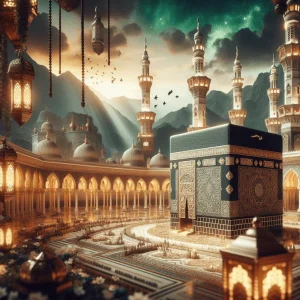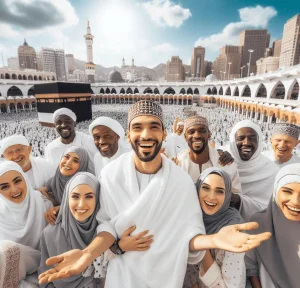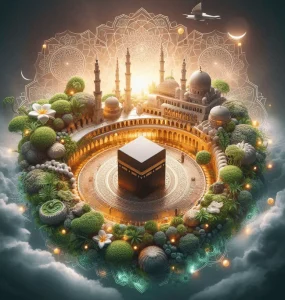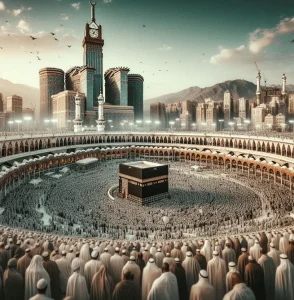Table of Contents
Muslim Holiday List In the rich tapestry of Islamic culture, holidays are vibrant threads that weave together faith, tradition, and communal harmony. These celebrations, filled with spiritual significance and joyous festivities, offer Muslims around the world a chance to reflect, rejuvenate, and reconnect with their heritage. From solemn days of fasting to exuberant festivals, the Muslim Holiday List encompasses a diverse array of occasions. Let’s embark on a journey through this ultimate list of Muslim holidays, uncovering their profound meanings and the unique ways they are observed.

1. Eid al-Fitr: The Festival of Breaking the Fast
One of the most anticipated events on the Muslim Holiday List is Eid al-Fitr. This joyous festival marks the end of Ramadan, the holy month of fasting. Celebrated on the first day of Shawwal, the tenth month of the Islamic lunar calendar, Eid al-Fitr is a time of immense joy and gratitude.
Celebrations and Traditions
Muslims begin the day with a special prayer service at mosques or open fields, dressed in their finest attire. The communal prayer, known as Salat al-Eid, is followed by a sermon and a heartfelt supplication for peace and prosperity. Families then gather for festive meals, often featuring an array of sweet delicacies, hence the name “Sweet Eid.” It’s also a time for giving Zakat al-Fitr, a form of charity, to ensure that all members of the community can partake in the celebrations.
Significance
Eid al-Fitr is not just about feasting and festivities; it embodies the spirit of unity, gratitude, and generosity. It marks the culmination of a month-long journey of self-discipline and spiritual reflection, celebrating the renewal of faith and the strengthening of communal bonds.
2. Eid al-Adha: The Festival of Sacrifice
Another cornerstone of the Muslim Holiday List is Eid al-Adha, commemorating the willingness of Prophet Ibrahim (Abraham) to sacrifice his son in obedience to God’s command. It is celebrated on the 10th day of Dhu al-Hijjah, the last month of the Islamic calendar, following the annual pilgrimage to Mecca, Hajj.
Celebrations and Traditions
Eid al-Adha begins with the Eid prayer, similar to Eid al-Fitr, followed by the ritual sacrifice of an animal, usually a sheep, goat, cow, or camel. The meat is then distributed among family, friends, and those in need, embodying the values of charity and community. Festive meals, family gatherings, and the exchange of gifts further enhance the joyous atmosphere.
Significance
Eid al-Adha, also known as the “Greater Eid,” is a profound reminder of faith, obedience, and the importance of sacrifice. It highlights the virtues of compassion and charity, as the act of sharing meat ensures that everyone, especially the less fortunate, can enjoy the celebrations.
3. Ramadan: The Month of Fasting
While not a single day, Ramadan itself is a pivotal event on the Muslim Holiday List. This sacred month involves a rigorous daily fast from dawn to sunset, aiming to purify the soul and strengthen one’s relationship with Allah.
Observances and Practices
During Ramadan, Muslims abstain from food, drink, and other physical needs during daylight hours. The fast is broken each evening with a meal called Iftar, often starting with dates and water. Suhoor, a pre-dawn meal, helps prepare for the day’s fast. In addition to fasting, Muslims engage in increased prayer, recitation of the Quran, and acts of charity. The last ten days of Ramadan are particularly significant, with Laylat al-Qadr, the Night of Power, believed to be among them.
Significance
Ramadan is a time of intense spiritual renewal, self-discipline, and heightened devotion. It fosters empathy for the less fortunate and a deeper sense of community. The practices and reflections during this month leave a lasting impact on the believer’s spiritual and moral fabric.
4. Laylat al-Qadr: The Night of Power
Within the sacred month of Ramadan, Laylat al-Qadr holds a special place on the Muslim Holiday List. It is believed to be the night when the Quran was first revealed to Prophet Muhammad by the angel Gabriel.
Observances and Practices
Laylat al-Qadr, occurring in the last ten nights of Ramadan, is a time for intensive worship and prayer. Muslims spend the night in prayer, seeking forgiveness, and making heartfelt supplications. Many also engage in the recitation of the Quran, reflecting on its teachings and seeking guidance.
Significance
Laylat al-Qadr is considered the holiest night in Islam, with acts of worship performed on this night believed to be more rewarding than a thousand months of worship. It’s a profound opportunity for spiritual cleansing and seeking divine mercy and blessings.
5. Islamic New Year: Muharram and Ashura
The Islamic New Year, marking the beginning of the month of Muharram, is another significant event on the Muslim Holiday List. Muharram is one of the four sacred months in Islam, and the 10th day, known as Ashura, holds particular importance.
Observances and Traditions
For Sunni Muslims, Ashura is a day of fasting in gratitude for the deliverance of Prophet Moses and the Israelites from Pharaoh’s tyranny. For Shia Muslims, Ashura commemorates the martyrdom of Imam Hussain, the grandson of Prophet Muhammad, at the Battle of Karbala. Shia communities engage in mourning rituals, including processions and recitations of elegies.
Significance
The Islamic New Year and Ashura underscore themes of reflection, gratitude, and remembrance. They highlight the principles of justice, sacrifice, and the enduring struggle against oppression.
6. Mawlid al-Nabi: The Prophet’s Birthday
Mawlid al-Nabi, celebrating the birth of Prophet Muhammad, is a cherished event on the Muslim Holiday List. Observed on the 12th day of Rabi’ al-Awwal, the third month of the Islamic calendar, it is a time of reverence and joy.
Celebrations and Traditions
Mawlid al-Nabi is marked by various festivities, including recitations of the Quran, storytelling about the life and teachings of the Prophet, and communal meals. In many Muslim-majority countries, streets and homes are decorated, and special events and gatherings are organized.
Significance
The celebration of Mawlid al-Nabi reflects the deep love and respect Muslims have for Prophet Muhammad. It’s an opportunity to reflect on his exemplary character and teachings, reinforcing the values of compassion, humility, and justice.
7. Isra and Mi’raj: The Night Journey and Ascension
Isra and Mi’raj, commemorating the night journey and ascension of Prophet Muhammad, is a spiritually significant event on the Muslim Holiday List. This miraculous journey is believed to have occurred on the 27th day of Rajab, the seventh month of the Islamic calendar.
Observances and Practices
Muslims observe this night with special prayers, recitation of the Quran, and recounting the story of the Prophet’s journey from Mecca to Jerusalem and his ascension to the heavens. The event is often marked by communal gatherings and educational activities.
Significance
Isra and Mi’raj highlight the Prophet’s close connection with Allah and serve as a reminder of the spiritual and moral heights that believers can aspire to. It underscores the importance of faith, prayer, and divine guidance.
8. Hajj: The Pilgrimage to Mecca
While not a holiday in the conventional sense, Hajj, the annual pilgrimage to Mecca, is a pivotal event on the Muslim Holiday List. It is one of the Five Pillars of Islam, obligatory for all Muslims who are physically and financially able to undertake it at least once in their lifetime.
Observances and Rituals
Hajj takes place during the first ten days of Dhu al-Hijjah. Pilgrims perform a series of rituals, including Tawaf (circumambulating the Kaaba), Sa’i (walking between the hills of Safa and Marwah), and standing in prayer at the plains of Arafat. The culmination of Hajj is marked by the sacrifice of an animal, similar to Eid al-Adha, and the festival itself is celebrated worldwide.
Significance
Hajj is a profound spiritual journey, symbolizing the unity of the Muslim ummah and the submission to Allah’s will. It is a time for self-purification, reflection, and renewal of faith. The experience of Hajj leaves an indelible impact on the believer’s spiritual and communal life.
9. Nisfu Sha’ban: The Night of Forgiveness
Nisfu Sha’ban, occurring on the 15th night of Sha’ban, the eighth month of the Islamic calendar, is a significant night of worship and reflection on the Muslim Holiday List.
Observances and Practices
Muslims spend this night in prayer, seeking forgiveness and making supplications for themselves and their loved ones. It is also a time for reflecting on one’s deeds and seeking to improve in the coming year.
Significance
Nisfu Sha’ban is considered a night when Allah’s mercy and blessings are abundantly available. It is a time to seek forgiveness for past sins and to make resolutions for personal and spiritual growth.
Muslim Holiday List
The Muslim Holiday List reveals a rich tapestry of spiritual, cultural, and communal observances that enrich the lives of Muslims worldwide. From the solemn fasting of Ramadan to the joyous celebrations of Eid al-Fitr and Eid al-Adha, each occasion offers a unique opportunity for reflection, gratitude, and unity. These holidays not only reinforce the core values of Islam but also foster a sense of belonging and shared purpose within the Muslim ummah. As we celebrate these diverse and meaningful occasions, we are reminded of the enduring power of faith, community, and the timeless teachings of Islam.





More Stories
A Journey Through Islamic History: Must Visit Muslim Destinations
Journey of Faith: Finding Peace and Inspiration at Nabawi Mosque
Your Ultimate Retreat at Safa Tower Hotel Madinah